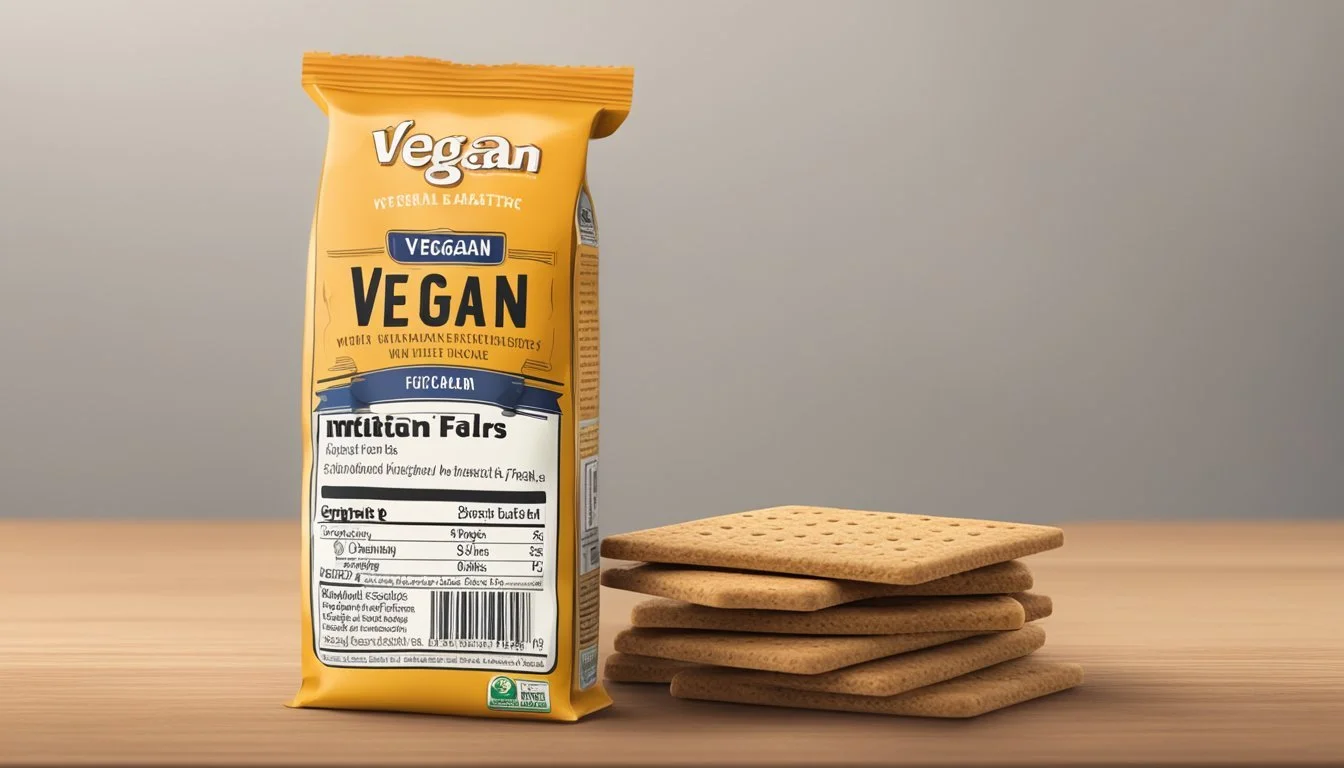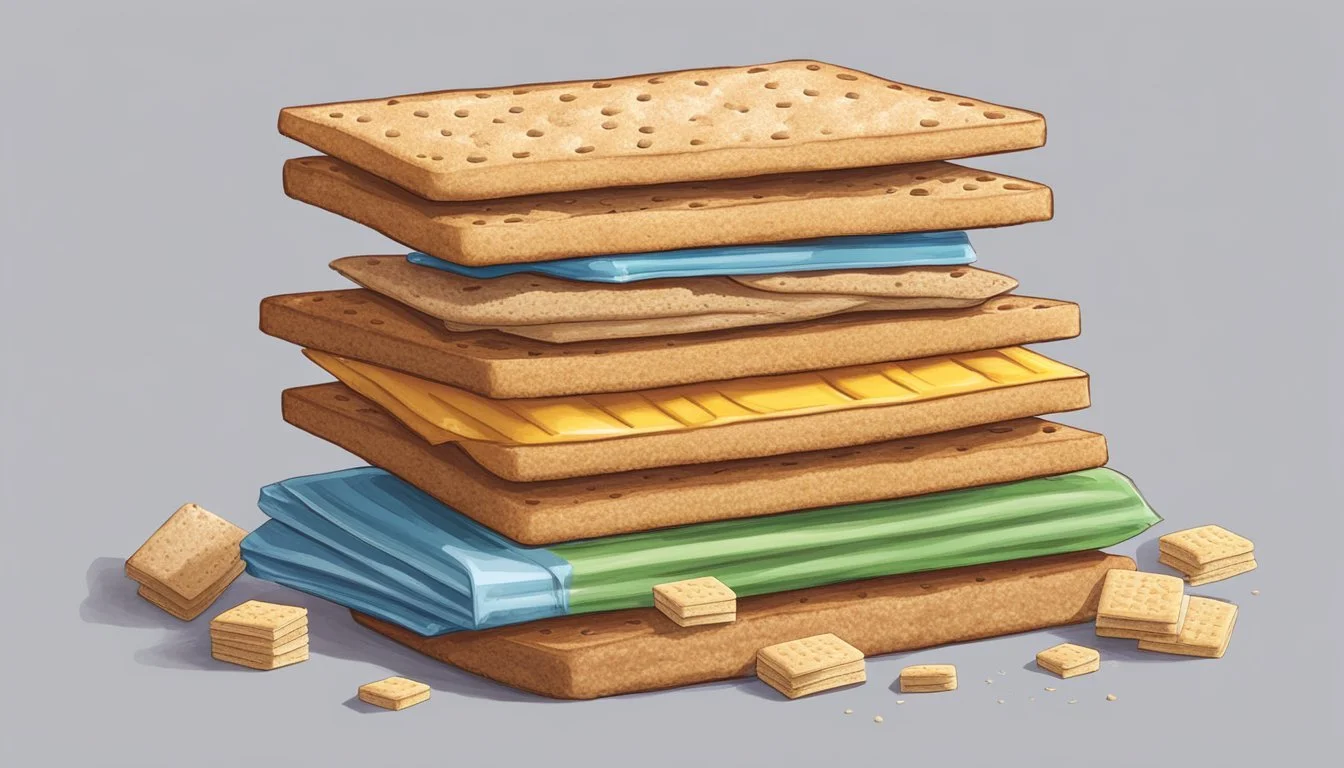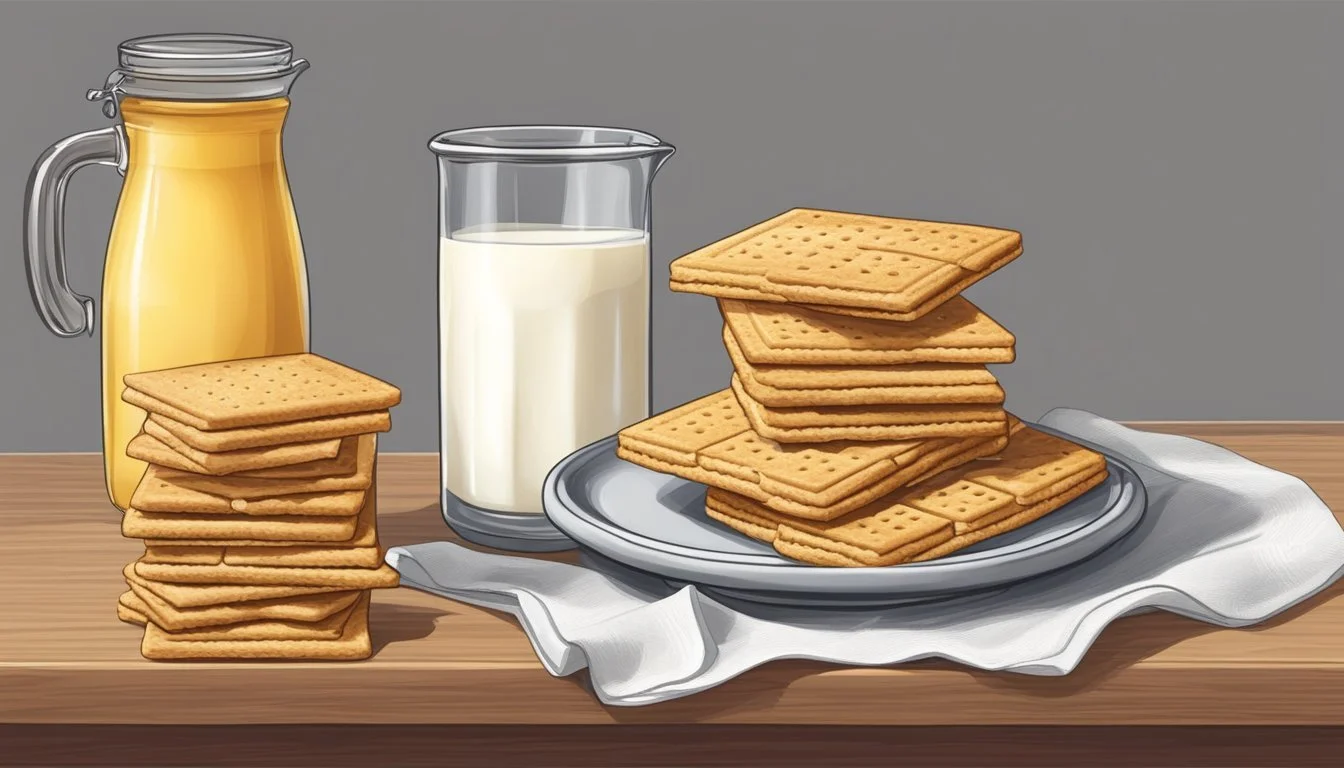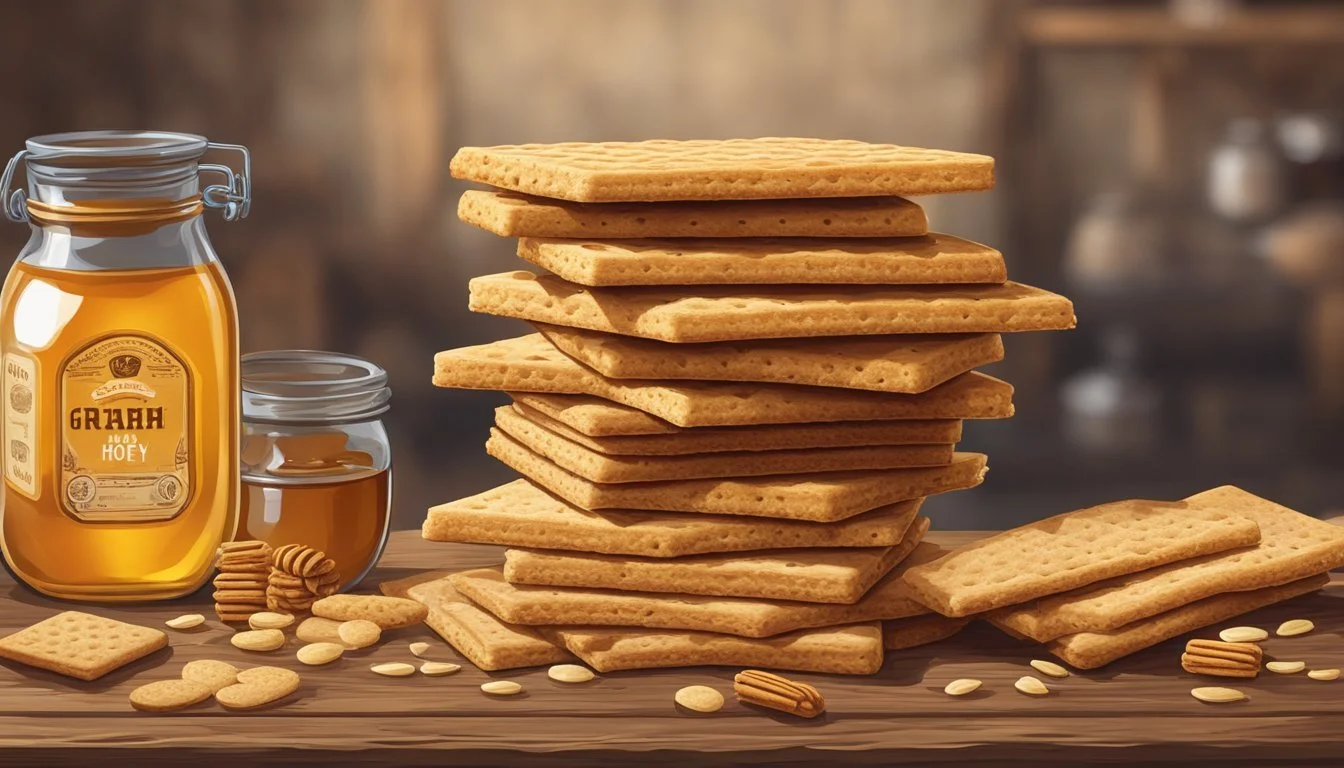Are Graham Crackers Vegan?
Unveiling the Ingredients
Graham crackers, a sweet, wheat-based snack, have been enjoyed for generations as a standalone treat or as a key component in recipes such as pie crusts. Traditional graham cracker recipes typically include graham flour, sweeteners like molasses or corn syrup, oil or shortening, and a leavening agent. However, with evolving dietary habits and preferences, many consumers now question whether these crunchy snacks comply with vegan standards, which exclude all animal products.
The vegan suitability of graham crackers often hinges on the type of sweetener used. The original recipe for graham crackers can be considered vegan, given it did not contain honey or other animal-derived ingredients. Yet, as manufacturers have developed various versions of graham crackers, some have added honey to their recipes, disqualifying those products from being considered vegan. Furthermore, other non-vegan ingredients that might be found in some brands include dairy or dairy derivatives.
Despite these concerns, there are several brands on the market producing graham crackers without the use of animal products, catering to vegan dietary requirements. Brands such as Nabisco and Keebler offer graham crackers that do not contain honey, making them suitable for a vegan diet. Consumers can also find alternative sweeteners if they wish to make their own vegan graham crackers at home. It is essential for vegans to read ingredient labels carefully, as products and recipes can vary significantly between manufacturers.
What Are Graham Crackers?
Graham crackers are a whole-wheat sweet biscuit that originated in the United States. They were developed by Sylvester Graham in the 19th century. These crackers are typically made using a combination of graham flour (a type of whole wheat flour), unbleached enriched flour, oil, sugar, salt, and a leavening agent. Some variations might include molasses or honey for sweetness, and additional flavors like cinnamon may be incorporated.
Key Ingredients Purpose Graham flour Adds flavor and fiber; gives texture Unbleached enriched flour Provides structure to the cracker Oil Adds crispness and prevents sticking during baking Honey or Molasses Sweetens the crackers naturally Flavors (e.g., Cinnamon) Enhances taste
While traditional graham crackers may contain honey, modern variations may substitute this with other sweeteners to cater to different dietary preferences, including veganism. The sweeteners, grains, and additional ingredients give graham crackers their distinctive taste and texture, making them a versatile snack that can be enjoyed on their own or used as an ingredient in other recipes, such as pie crusts and cheesecakes.
Identifying Non-Vegan Ingredients
When examining graham crackers for vegan suitability, it is crucial to recognize specific non-vegan ingredients that may not be immediately apparent.
Common Non-Vegan Additives
Non-vegan additives are often included in graham crackers for various purposes, such as improving texture or extending shelf life. Common non-vegan additives to look for include:
Dairy: This category includes milk, whey, casein, and lactose.
Eggs: Eggs may be used as a binding agent in some recipes.
Butter: Sometimes added for flavor, making the product non-vegan.
Additionally, natural flavors and artificial flavors can be of animal origin, but without specific details, they remain ambiguous.
Animal-Derived Sweeteners
Sweeteners derived from animals are another essential consideration when identifying non-vegan graham crackers:
Honey: Frequently used in graham cracker recipes, such as those by Honey Maid.
Confectioner's Glaze: Contains shellac, which is derived from the secretions of lac insects.
For a graham cracker to be considered vegan, it must not contain honey or any other sweeteners derived from animal products.
Health Considerations
When evaluating the healthiness of graham crackers, especially vegan-friendly options, one must consider their nutritional content and any potential allergens they may contain. This analysis helps determine how they fit into a vegan diet from a health perspective.
Nutritional Content
Graham crackers can provide essential nutrients that are crucial for a balanced vegan diet. They often contain fiber, which aids in digestion, and depending on the brand, can be made with whole grains that offer additional nutrients and minerals. Vegan graham crackers, specifically those not containing honey, should still be consumed in moderation, as they may contain added sugars and fats. An average serving of graham crackers (approximately 28g) might typically have the following nutritional profile:
Calories: 120 - 140kcal
Protein: 1 - 2g
Iron: 0.72 - 1.44mg
Fiber: 0.8 - 1.2g
These values can vary among brands and formulations. Consumers should check the nutrition labels for precise information.
Potential Allergens
While graham crackers can be an inclusive snack for those following a vegan lifestyle, they can also contain allergens such as wheat (gluten) and soy, which are common in many commercial varieties. Individuals with allergies need to scrutinize ingredient lists carefully. It is not uncommon for some vegan graham crackers to be produced in facilities that handle nuts, dairy, or eggs, which poses a risk of cross-contamination. Allergen-free options may be available from select brands committed to avoiding common allergens in their products.
Vegan-Friendly Graham Cracker Brands
For those adhering to a vegan diet, finding suitable graham cracker options free from animal products is essential. Nabisco offers options that typically pass the vegan test, excluding any honey-flavored varieties. Kroger also has graham crackers that fit vegan standards. Similarly, Keebler provides products that are considered vegan-friendly, ensuring that those who prefer this brand have accessible choices.
Kinnikinnick's S'moreables Graham Style Crackers stand out not only as a vegan option but as a gluten-free alternative as well. Although they are dairy-free, it's worth noting that there is potential for cross-contamination with egg products, so individuals with severe allergies should be cautious.
Teddy Grahams (excluding honey varieties)
Annie's Bunny Grahams
It's important to carefully examine ingredient lists. For example, while Annie's Organic Honey Grahams are organic, the inclusion of honey does not meet vegan criteria. Trader Joe’s Honey Graham Crackers fall into the same category, with honey being a primary sweetener that is not considered vegan.
When opting for Kellogg's brands of graham crackers, vegans should select the original flavor, which relies on molasses and corn syrup for sweetness, rather than honey.
Lastly, there are various health-food brands offering vegan graham cracker pie crusts for those looking to create desserts without having to compromise their dietary preferences. With careful selection, vegans can enjoy a range of graham cracker products suitable for their lifestyle.
Understanding Food Labels
When searching for vegan graham crackers, it's critical to understand how to read and interpret food labels accurately. The labels contain essential information that can guide vegans in choosing products that align with their dietary preferences.
Vegan Labeling
Vegan Certification: If a product is certified vegan, it will often display a specific vegan logo, indicating that it contains no animal-derived ingredients and has not been tested on animals. This certification provides assurance that the product is suitable for vegans.
Ingredients List: Always examine the ingredients list for non-vegan items. Ingredients like honey or natural flavors can sometimes be of animal origin. If a graham cracker includes organic honey, it is not vegan, as honey is an animal by-product.
Misleading Terms
Natural Flavors: The term "natural flavors" can be ambiguous. While it may sound harmless, natural flavors can be derived from either plant or animal sources. Vegans should research or inquire with the manufacturer to determine the origin of these flavors in graham crackers.
Organic: Some consumers mistakenly believe that "organic" is synonymous with vegan. However, organic products can still contain animal-derived ingredients such as organic honey. Being organic does not automatically make a food item vegan.
It's essential for consumers to approach food labels with scrutiny to ensure that their dietary choices are in line with their vegan lifestyle.
Vegan Alternatives and Substitutes
For those adhering to a vegan diet, finding vegan-friendly graham crackers is important, as traditional recipes may include honey or dairy products. A careful examination of the ingredients list is essential when choosing snacks that align with vegan principles.
Store-Bought Options:
Several brands offer honey-free variants of graham crackers that are suitable for vegans. These often use molasses or corn syrup as sweeteners instead of honey. Some recognizable brands include:
Nabisco Grahams Original
Kinnikinnick Foods S'moreables Graham Style Crackers
Teddy Grahams Cinnamon Graham Snacks
Making Your Own:
For those who enjoy baking, making vegan graham crackers at home is an option. A simple vegan recipe may include:
Graham flour
Plant-based oil (e.g., canola oil)
Molasses or maple syrup
A leavening agent (e.g., baking soda)
A pinch of salt
Mix dry ingredients, then add wet ingredients to form a dough. Roll out, cut into shapes, and bake until crisp.
Summary Table:
Here's a quick guide to some vegan graham cracker choices and substitutes:
Brand/Option Vegan-Friendly? Note Nabisco Grahams Original Yes Molasses sweetened, widely available. Kinnikinnick Foods S'moreables Yes Gluten and dairy-free, marketed for smores. Store brand graham crackers Varies Check for honey-free versions. Homemade vegan graham crackers Yes Control over sweeteners and oil used.
Remember, when shopping for vegan graham crackers, always verify that the product is dairy-free and honey-free to ensure it meets vegan standards. Homemade recipes can be adapted to taste and dietary needs, offering a customizable vegan snack option.
The Role of Graham Crackers in Diets
Graham crackers have a historic place in dietary choices, especially regarding vegetarianism and veganism. They were initially created as a health food, and today they are scrutinized for their ingredients by those following plant-based diets.
Veganism
For vegans, the most crucial aspect of a food item is its lack of animal-derived ingredients. Traditional graham crackers, which contained graham flour, shortening, oil, molasses, or corn syrup, and salt, were inherently vegan. However, modern graham crackers often include honey or milk, both of which vegans avoid due to their animal origins. Vegans also inspect the type of oil used, as palm oil, a common ingredient, raises concerns related to environmental sustainability and animal welfare. Here is a breakdown of graham cracker ingredients in relation to veganism:
Vegan-friendly: Graham flour, plant-based oils, molasses, corn syrup, salt
Non-vegan ingredients to avoid: Honey, milk, or milk derivatives
A subset of store brands offers vegan graham crackers, usually distinguished by their lack of honey. Vegans must diligently check labels, looking for animal ingredient disclosures and certifications like "Certified Vegan."
Vegetarianism
Vegetarians, who avoid consuming meat but may include dairy and other animal by-products in their diets, have more options when choosing graham crackers. The presence of honey or dairy does not typically pose a problem for lacto-ovo vegetarians (those who consume eggs and dairy). However, some vegetarians choose to abstain from products like honey for ethical reasons, aligning with vegans on this specific criterion. The interest lies in the source of the shortening or fat used, which could potentially be animal-based. Here's a summary for vegetarians:
Generally acceptable: Graham flour, plant-based or dairy oils, molasses, corn syrup, salt, honey
Ingredients of concern: Animal-derived fats or oils (less common in modern graham crackers)
Both vegetarians and vegans value graham crackers as a versatile component in desserts and snacks, provided they adhere to their dietary lifestyles. They remain a food item under examination for those following strict plant-based diets.
Culinary Uses of Graham Crackers
Graham crackers serve as a versatile ingredient in the culinary world. They are a popular snack due to their subtle sweetness and satisfying crunch. Enjoyed on their own, they can also be a vehicle for various spreads such as peanut butter or vegan cream cheese.
For desserts, these crackers are an essential component in the American campfire classic, s'mores. Traditionally, a piece of chocolate and a marshmallow are sandwiched between two graham crackers. Vegan versions of s'mores can be crafted using dairy-free chocolate and plant-based marshmallows.
In the realm of recipes, graham crackers are often crushed to create a base for an array of pies and cheesecakes. They provide the foundation for the crust, which can be mixed with vegan butter or coconut oil to hold the shape. Chefs appreciate their ability to balance out more decadent and creamy fillings, ensuring the final product isn't overwhelmingly rich.
Snack Pairings:
Nut butters
Fruit jams
Dairy-free chocolate
Dessert Recipes:
Vegan cheesecakes
Pie crusts
S'mores
The crumbly texture of graham crackers also lends itself well to incorporation into baked goods, such as cookies or as a topping for vegan yogurt bowls, adding a pleasant crunch. They can sprinkle over ice cream or folded into pudding, where they soften slightly, providing an interesting textural contrast.
Creative cooks also use them as a base in savory applications, such as a crumb coating for tofu or plant-based "chicken" cutlets, showcasing the cracker's flexibility in vegan cuisine.
The History of Graham Crackers
The origins of graham crackers date back to the early 19th century and are linked to a man named Sylvester Graham. They were named after him and were originally conceived as a health food as part of his Graham Diet movement. This Presbyterian minister advocated for dietary reform and emphasized whole wheat flour, arguing that it had high nutritional value and could aid in curbing the cravings for sinful indulgences.
Ingredients initially used in the production of graham crackers included:
Graham flour (a type of whole wheat flour)
Oil or shortening
Sweeteners like molasses or corn syrup
Salt
Over time, graham crackers have evolved from their simple original recipe. With the onset of mass production, ingredient variations arose, and not all of them adhered to Graham's initial specifications, particularly the use of vegan ingredients.
Innovation and Variations:
Post-1830s: Once commercialization took hold, producers began to modify the formulation of graham crackers.
Present Day: Modern versions of graham crackers often include honey or honey flavor, which raises questions about their vegan status.
Sylvester Graham's influence persists in that the crackers still carry his name and retain an association with health-conscious eating, despite changes in their composition. Today, there are brands that produce vegan-friendly graham crackers, using sweeteners like molasses and corn syrup instead of honey and ensuring that all ingredients are plant-based.








